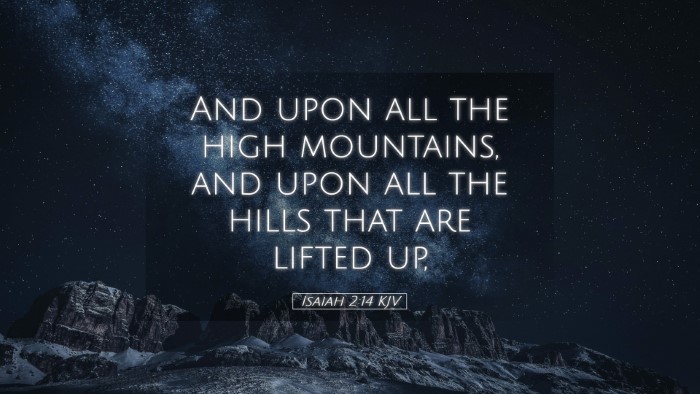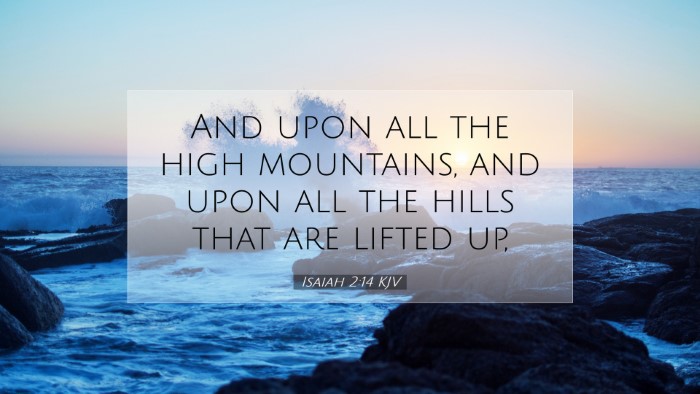Commentary on Isaiah 2:14
Verse: "And upon all the houses of the mighty, and upon the high towers." (Isaiah 2:14)
Introduction
The verse from Isaiah 2:14 serves as a warning and a pronouncement of judgment against the pride and arrogance of humanity, particularly the powerful and those who elevate themselves through earthly means. The public domain commentaries provide various insights that enhance our understanding of this scriptural passage.
Contextual Background
Isaiah prophesies during a time of impending judgment upon Judah and Jerusalem, where social injustice, idolatry, and reliance on human power have become rampant. This verse specifically addresses the consequences that will befall those who are considered 'mighty' and those who build 'high towers', symbols of human pride and ambition.
Insights from Matthew Henry
Matthew Henry emphasizes the theme of accountability for human pride in his commentary. He notes:
- The Houses of the Mighty: Henry suggests that this refers to the residences of influential figures who are proud and who have neglected their responsibilities towards God and their fellow man. The judgment upon them indicates that no earthly power can shield one from divine wrath.
- The High Towers: He points out that these towers symbolize human attempts at security and strength. Towers are built for protection, yet Isaiah reveals that such efforts are futile against God's judgment.
- Divine Judgement: Henry articulates that God's judgment is impartial and will reach every corner of society, from the most powerful to the least. This pronouncement serves as a reminder that all are equal before God.
Insights from Albert Barnes
Albert Barnes provides a detailed analysis of this verse by examining the social and spiritual conditions prevailing at the time of the prophet:
- The Nature of Judgment: Barnes interprets the 'high towers' as metaphors for pride and ambition that lead humanity away from God. He underscores that these structures will not withstand the coming judgment.
- Universal Application: Barnes highlights that the warning is not isolated to Jerusalem; rather, it applies universally to all who place their trust in human power and material wealth.
- Call to Humility: His commentary reflects a call to humility and a recognition that true security comes from reliance on God, not on human constructs.
Insights from Adam Clarke
Adam Clarke's exposition provides a historical and theological perspective that is particularly insightful:
- Historical Context: Clarke notes that the 'houses of the mighty' likely refer to royal palaces and the elite of society. At this time, powerful leaders often turned away from God, prioritizing their status and wealth.
- Symbolism of Towers: He interprets the 'high towers' as a representation of arrogance and self-reliance. Such edifices stand as monuments to human pride but will ultimately be brought low.
- God's Sovereignty: Clarke emphasizes the sovereignty of God over all creation. His judgment will serve to restore order and bring humility where pride once reigned.
Theological Implications
This verse encapsulates several theological themes pertinent to contemporary readers:
- The Nature of Human Pride: It serves as a profound reminder of the dangers posed by human pride and the folly of attempting to establish security independent of God.
- Judgment and Justice: The assurance of God's forthcoming judgment should encourage an attitude of repentance and a return to righteousness.
- Call for Reflection: This passage invites pastors, students, and scholars to reflect on their own lives and ministries. It highlights the necessity of surrendering pride and asking whether one stands on the foundations of faith or the illusions of self-reliance.
Application
The reflection on Isaiah 2:14 poses a challenge for modern believers:
- Personal Examination: Individuals are encouraged to examine their lives for signs of pride and independence from God.
- Church Leadership: Pastors are called to lead by example in humility, ensuring their congregations are grounded in the truth of God's word rather than personal ambition.
- Community Engagement: The faithful are encouraged to engage with their communities, sharing the message of God's justice and mercy.
Conclusion
Isaiah 2:14, with its vivid imagery of judgment upon the mighty and the proud, offers a formidable call to humility, reflection, and divine dependence. Insights from public domain commentaries by recognized scholars underscore the weight of this passage with timeless truths relevant to all walks of faith. In a world often drawn to human strength, this scripture reminds us of the ultimate authority of God and His unyielding justice.


